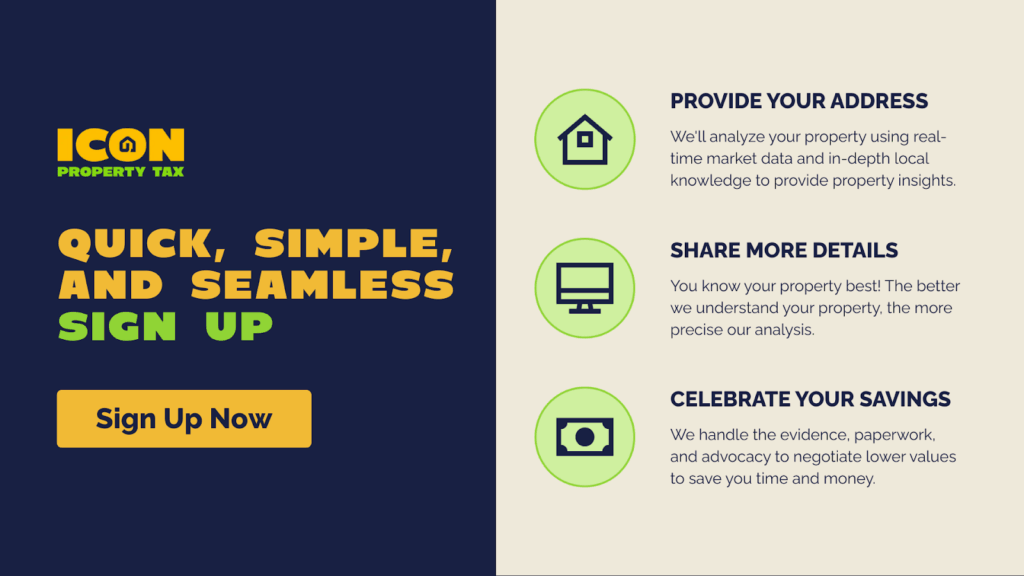Tennessee Property Tax Guide: Rates, Exemptions, And How To Save
September 10, 2025
Key Takeaways:
- How Tennessee Property Taxes Are Calculated: Tennessee property taxes are determined by local governments. They are based on the property’s appraised value, an assessment ratio, and local tax rates, and the law requires regular reappraisals.
- Exemptions & Appeal Rights That Can Lower Your Tax Bill: Exemptions and appeal rights, including those for seniors, veterans, and nonprofits, can significantly reduce property tax liabilities if navigated correctly. However, they require a thorough understanding and timely application.
- Why Work With A Professional Property Tax Consultant: Partnering with professional property tax consultants, such as Icon, can help ensure accurate assessments and maximize savings, with services often offered on a contingency basis to eliminate up-front costs.
At Icon, we’ve helped property owners save over $100 million in tax reductions, backed by a 90% success rate. With over 30 years of combined experience, our team knows how to challenge unfair valuations and fight for fair property tax payments. Last year alone, 82% of our clients saw a reduced assessment. No upfront fees. No guesswork. Just proven strategies, local expertise, and results that speak for themselves.
Understanding Tennessee property tax can be overwhelming, especially with varying rates, complex exemptions, and tight appeal deadlines. Knowing where your money goes and how to protect it matters whether you’re a first-time homeowner or a long-time resident.
This blog will explore how Tennessee property taxes are calculated, what exemptions might apply to your situation, and when it’s time to consider appealing your assessment.
Understanding Tennessee Property Tax Basics
Tennessee’s property tax system may look simple, but beneath the annual bill lies a set of rules and processes that aren’t always obvious to residential and commercial property owners. Property taxes in Tennessee are primarily local taxes, meaning your county or city government sets the rates and handles the assessment and collection process. The revenue from these taxes funds vital community services like schools, emergency services, and infrastructure projects.
How Property Values Are Determined
The local county assessor assigns an appraised value to every property in Tennessee. This appraised value is based on location, property type, improvements, and recent sales in the area. Next, an assessment ratio is applied to determine the property’s assessed value, which is what the actual tax rates are applied to. The estimated value is usually 25% of the appraised value for residential real estate. For commercial property, it’s 40%. Tangible personal property and utilities are taxed at different rates and ratios.
The Role Of Millage Rates
After calculating your property’s assessed value, local governments apply millage rates, sometimes listed as a percentage, sometimes per $100 of assessed value, to figure your tax bill. These rates can vary significantly from one county or municipality to another, even within the same metro area. Property owners should also know that Tennessee law requires periodic reappraisals to keep property values current; these generally happen every 4-6 years.
Your Right To Appeal Or Protest
There’s built-in recourse if you disagree with your property valuation. Tennessee law allows property owners to file an appeal or protest with the county Board of Equalization if they believe their assessment isn’t accurate. This can be an effective way to correct overvaluations and lower your property tax burden. Keeping a close eye on deadlines and documentation is key, since missing a step can cost you the chance to contest your assessment that year.

Calculating Your Estimated Property Tax Bill
Understanding your Tennessee property tax bill starts with a simple formula:
Appraised Value x Assessment Ratio x Local Tax Rate.
Here’s what that means for you as a property owner:
- Appraised Value: This is the market value your county assessor assigns to your property, which it would likely sell for on the open market.
- Assessment Ratio: Tennessee uses different ratios based on property type. Residential property is assessed at 25% of appraised value, while commercial and industrial property is assessed at 40%.
- Local Tax Rate: This is a figure set by your county and city governments, expressed in dollars per $100 assessed value. Tax rates can widely vary depending on your property’s location.
Let’s break it down with an example. Say you own a residential home in Davidson County that’s appraised at $400,000.
- Determine Assessed Value: $400,000 (appraised value) × 25% (residential assessment ratio) = $100,000 assessed value
- Check The Local Tax Rate: For example, Davidson County’s combined city and county rate might be $4 per $100 of assessed value (always verify the current rate for your jurisdiction).
- Calculate Your Annual Tax: $100,000 ÷ 100 × 4 = $4,000 annual property tax
Remember that new property appraisals usually happen every four years, but local governments can adjust local tax rates annually. If your property value spikes, so can your tax bill, unless the rate is lowered. Use the 40% assessment ratio in the same calculation for commercial property owners to get your estimated bill. Double-check exemptions or property tax relief programs you might qualify for, as they can make a notable difference in your bottom line.
Commonly Overlooked Exemptions In Tennessee
While most owners know about the basic homestead and veteran exemptions, several lesser-known tax breaks are available if you know where to look.
Nonprofit Property Exemptions
One often-missed exemption involves properties owned by certain nonprofit organizations. Facilities used exclusively for religious, charitable, scientific, or educational purposes may qualify for substantial property tax relief. Even small details in property use, like allocating a building section strictly for eligible purposes, can impact exemption eligibility.
Senior And Disabled Homeowner Programs
Another category includes seniors and disabled homeowners. Tennessee offers the Tax Relief Program, providing a partial reimbursement to qualifying elderly or disabled residents. However, it’s easy to overlook updated income limits or new required documentation affecting yearly eligibility.
Historic Property Exemptions
Historic property exemptions are also frequently skipped. In specific cases, owners restoring qualifying historic structures can apply for tax freezes or reductions that aren’t automatically applied at the county level. These programs often require proactive annual filing and strict adherence to restoration criteria.
Agricultural, Forest, And Open Space Land
Finally, under Tennessee’s Greenbelt Law, some counties allow exemptions or reduced rates for agricultural, forest, and open space land. Qualifying land must be used for agricultural production, forest management, or as open space for future generations. These exemptions can translate into major savings, but the initial application and annual recertification process frequently trips up first-time applicants.

How To File For A Property Tax Exemption
Filing for a property tax exemption in Tennessee starts with understanding which exemptions you may be eligible for.
Common examples include those for senior citizens, disabled homeowners, veterans, and certain nonprofit organizations.
- Identify Eligible Exemptions: Start by confirming which exemptions apply to you. Tennessee offers options for senior citizens, disabled homeowners, veterans, and qualifying nonprofits. Eligibility varies by county, so carefully review requirements and confirm deadlines with your local property assessor’s office.
- Gather Required Documentation: Prepare documentation that proves eligibility. This may include proof of age, disability verification, income records, or documentation of property use for nonprofits. Ensure all information matches property records to avoid delays or denials during the review process.
- Obtain The Application: You can access the exemption application directly from your county assessor’s website or request it in person. Review theinstructions closely, as counties may have different application forms and submission processes that can impact how quickly your request is handled.
- Complete And Submit The Application: Fill out the application accurately and attach all supporting documentation. Submit it to the county property assessor’s office by mail, in person, or online if available. Always keep a full copy of what you submit for reference.
- Monitor The Status: After filing, track your application with the assessor’s office to confirm receipt and progress. Contact the office if you don’t receive timely confirmation. Missing updates or deadlines can result in losing exemption eligibility for that tax year.
- Respond To Denials Or Issues: If denied, review the official reason and correct errors quickly. Many counties allow an appeal process to contest decisions. Submitting corrected documents within the timeframe provided can protect your eligibility for future property tax relief.
How Icon Property Tax Helps Tennessee Owners Save
For both homeowners and business owners, the potential for over-assessment often leads to paying more in property taxes than necessary. An expert partner on your side can make all the difference.
Professional Guidance Through The Appeal Process
A professional property tax consultant handles the appeal process from start to finish, so you don’t have to face dense paperwork or difficult conversations with local officials alone. The team analyzes your property’s assessment using deep local market knowledge, identifying discrepancies or missed details that could lower your bill. With access to robust sales data and market trends, they build a compelling case, file the appeal, and represent your interests directly with county assessors.
A No-Upfront-Fee Model That Reduces Risk
What sets this service apart is a no-upfront-fee model: payment only happens if real, tangible tax savings are achieved. This approach removes the risk of spending on uncertain outcomes and makes expert assistance accessible for all property owners.
Support For Exemption Applications
The service doesn’t stop at appeals. Owners seeking exemptions, such as those for seniors, veterans, or non-profits, can get help reviewing their exemption applications before submission, maximizing the likelihood of approval and further reducing tax burdens.
Peace Of Mind With Experienced Advocates
Ultimately, with the right advocate, every stage of the appeal or protest is professionally managed. Owners receive regular updates and real-time insights, making it simple to track progress without the hassle of chasing down information. Peace of mind and potentially significant property tax savings, all handled by a team with decades of local experience.

Final Thoughts
Navigating Tennessee property taxes can be challenging, but knowledge and proactive steps can translate into real savings for property owners. From understanding local rates and assessment cycles to researching available exemptions, staying informed is your first defense against overpayment.
Yet even well-read owners face a system that isn’t always transparent, and that’s where Icon steps in. For over thirty years, we’ve built appeals, managed direct negotiations, and tapped into local data to defend the interests of both residential and commercial clients. With our no-savings, no-fee policy, you’re never risking payment on speculative outcomes.
Reach out to Icon to see how much you could save on your Tennessee property taxes.
Read also:
- Looking To Pay Off Your Home Sooner? Here’s What Two Extra Yearly Payments Can Do
- Why Your Property’s Assessed Value Doesn’t Match Its Market Value (And Why It’s Important)
- Think You Might Be Overpaying In Property Taxes? A Tax Grievance Could Save You Big
Frequently Asked Questions About Tennessee Property Tax
How often are property taxes assessed in Tennessee?
Property values are reappraised by county assessors every four to six years in Tennessee. Between reappraisals, values typically remain stable unless you make significant property improvements or there are widespread market changes.
What is the average property tax rate in Tennessee?
Tennessee’s effective property tax rate is generally lower than the national average. Rates vary widely by county, but most homeowners pay between 0.5% and 0.7% of their home’s market value annually.
Who sets property tax rates in Tennessee?
Local governments—city and county officials—set property tax rates in Tennessee. The rates can vary yearly based on budget needs, school funding, and other local factors.
Are there any property tax exemptions in Tennessee?
Yes, there are. The state offers several exemptions and relief programs for qualified residents, including seniors, disabled homeowners, disabled veterans, and surviving spouses. Exemptions typically apply to a portion of your primary residence’s value and can lower your tax bill.
How do I qualify for property tax exemptions in Tennessee?
Qualification depends on specific program requirements. Most exemptions require the property to be your primary residence and may have age, income, or disability criteria. Documentation and a formal application are typically required, and deadlines vary by county. Icon will help review your exemption paperwork before you submit it.
What is the Homestead Exemption in Tennessee?
Tennessee does not have a traditional homestead exemption that automatically reduces your assessed value. Instead, the state offers property tax relief and freeze programs for qualifying elderly, disabled, or veteran homeowners on their primary residence.
Are seniors eligible for property tax relief in Tennessee?
Yes. Tennessee has a property tax relief program specifically for seniors age 65 or older who meet certain income requirements. Eligible seniors can receive a benefit that covers part or all of their property taxes on their primary home. If you have questions about relief eligibility or paperwork, Icon can review your application before you file.

